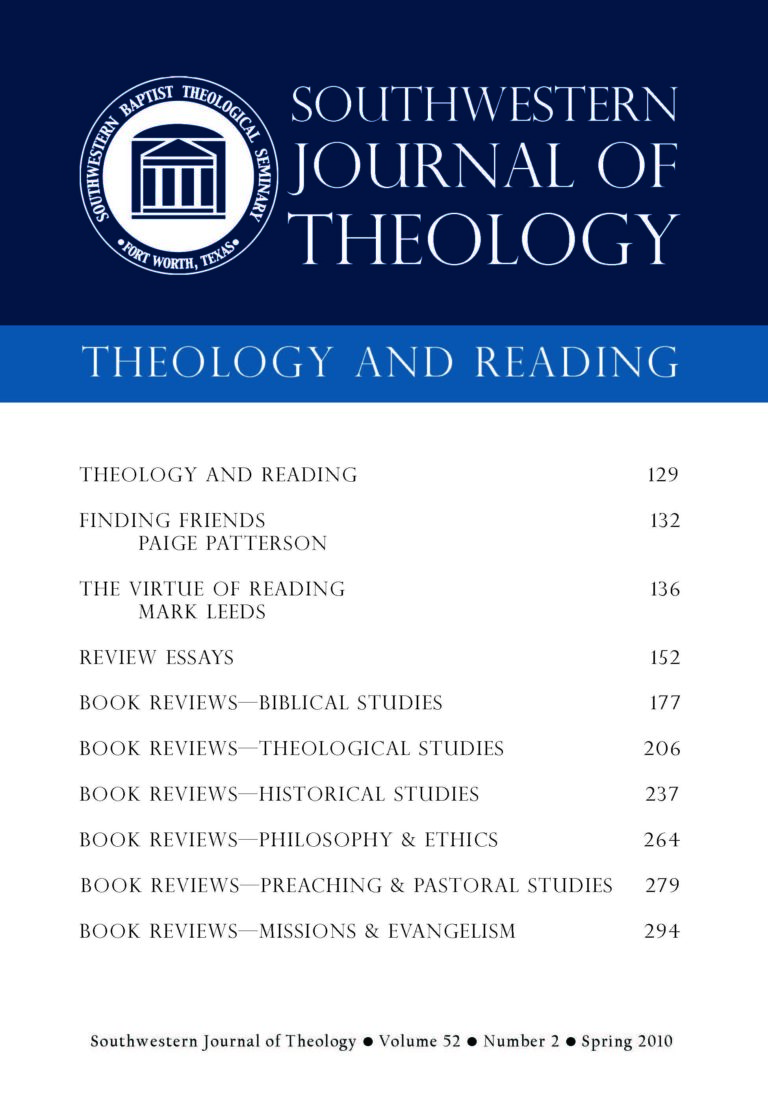
Theology and Reading
Southwestern Journal of Theology
Volume 52, No. 2 – Spring 2010
Managing Editor: Malcolm B. Yarnell III
By John Frame. Phillipsburg: P&R, 2008. 1069 pages. Hardcover, $45.99.
For those seeking a relatively comprehensive ethics text from an evangelical perspective, John Frame delivers just such a book. The Doctrine of the Christian Life is the third of four books in Frame’s “A Theology of Lordship” series. In this volume he addresses the subject of Christian ethics. Frame defines ethics as, “theology, viewed as a means of determining which persons, acts, and attitudes receive God’s blessing and which do not” (10). The book is divided into six parts, but is dominated, as are many other evangelical ethics texts, by his exposition of the Decalogue. Because Frame views the revelation of God as the basis of ethical judgment, he affirms the Decalogue as a primary source from which one can make ethical judgments. His method of exposition is to take several chapters for each of the commandments. The first chapter of a section usually provides the Westminster Larger Catechism’s comments upon the particular commandment. Frame then applies what he terms a “triperspectival” hermeneutic to the passage.
In traditional Reformed fashion, Frame examines both the positive and the negative aspects that are implicitly contained in a specific commandment. Doing so provides an almost infinite number of ethical topics that Frame could examine under a given commandment. He does an excellent job of covering material that is explicit to the commandment while also breaking some new ground.
Frame’s triadic perspective upon ethics is divided into the normative perspective, the situational perspective, and the existential perspective. Ethicists at various times have placed emphasis upon each of these perspectives. Frame views the three perspectives as forming a vital balance, or triangle (35), by which one may properly do ethics. These three perspectives form a unified whole by which one may examine an ethical situation. When Frame examines an ethical situation, he attempts to do so by applying these three perspectives to the situation.
In terms of critique, Frame is coming from a Presbyterian background, and a Baptist may be wary of at least three different instances in which Frame defends pedobaptism (259, 288–89, 558). His main argument is that pedobaptism was simply assumed by the New Testament believers. This leaves open the question of what else is assumed but not explicit in cruxes of the faith. In fairness to Frame, pedobaptism is not made into a major issue in this book. Another minor area of critique would be concerning Frame’s exposition of the tenth commandment. Whereas an average of 49 pages are given to commandments 1–9, the tenth commandment receives a mere seven pages. Perhaps it is unfair to critique Frame on length concerning the overall length of the book, but nonetheless this particular section could have been expanded somewhat further.
The Doctrine of the Christian Life is a valuable contribution to the study of Christian ethics for a number of reasons. The sheer breadth of material covered in this book will be helpful to a novice or a scholar in the field of ethics. Although Frame’s exposition of the Decalogue dominates this book, he does engage other areas of ethics that are helpful. Frame’s evaluation of non-Christian ethics in part two, and of Christian ethics in part three are beneficial resources for understanding the various systems of ethics. Part five concerns the relationship of Christ and culture and is helpful in establishing how the believer should relate with the culture. Although this is a massive volume, it is well organized and easily accessible to the reader. Frame is thoroughly evangelical in his outlook, and this book will surely become a favorite text among evangelical ethicists.





